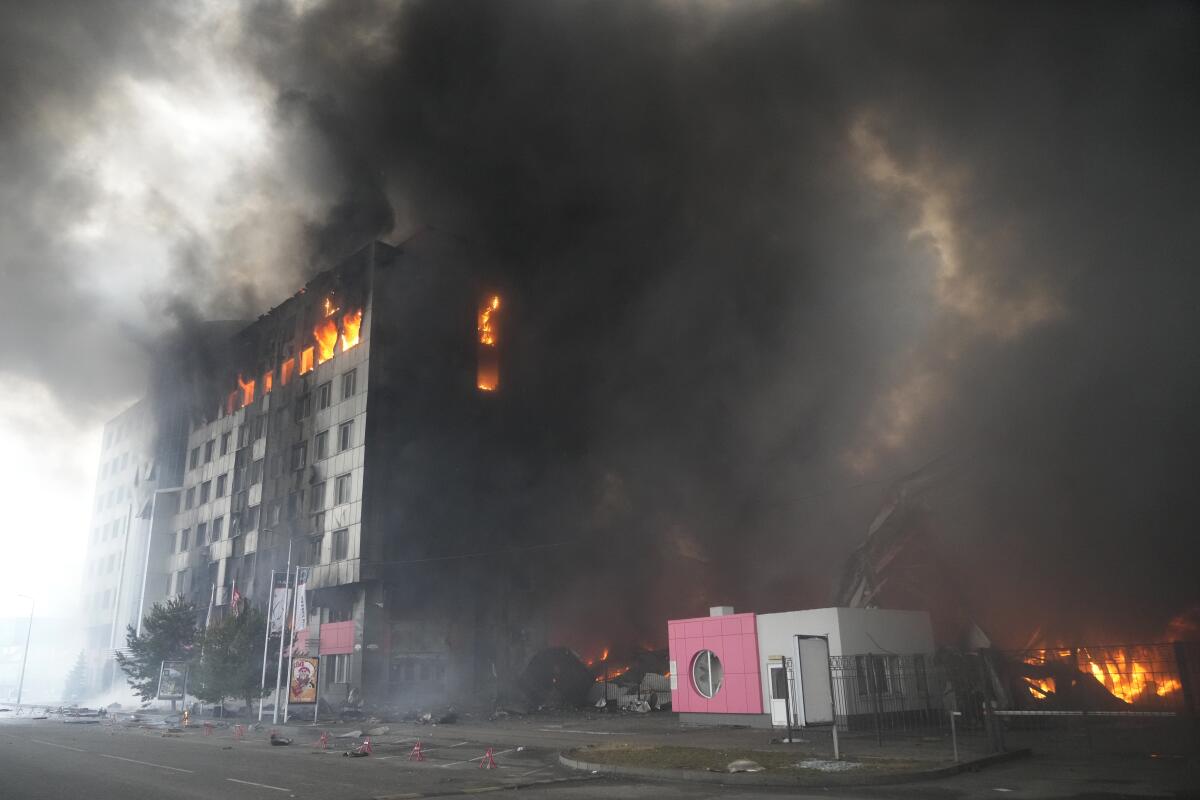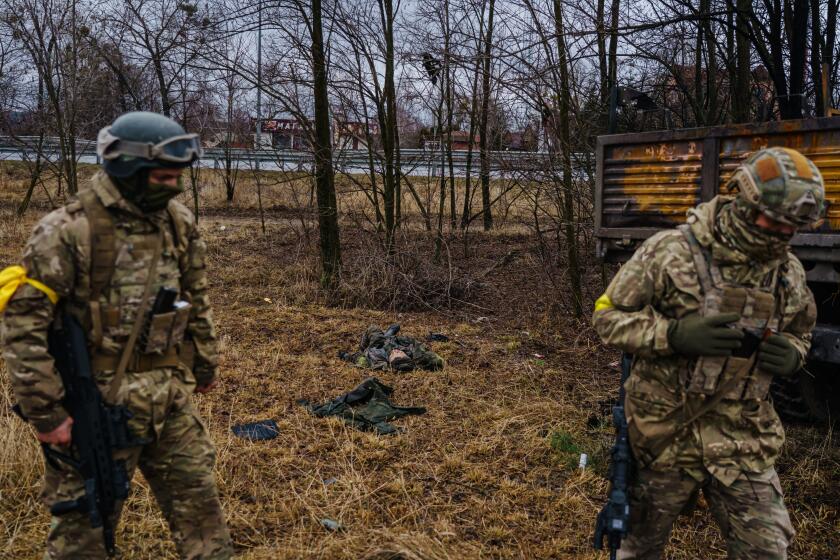Putin’s crime of aggression in Ukraine and the International Criminal Court

- Share via
The opening of an International Criminal Court investigation into the crimes perpetrated by Russian forces in Ukraine has raised hopes that Vladimir Putin’s regime will be brought to justice. But formidable obstacles stand in the way of actually holding the Russian president and his inner circle to account.
In response to an unprecedented referral from 39 ICC member states, ICC Chief Prosecutor Karim Khan announced Wednesday the start of an investigation into potential war crimes and crimes against humanity committed in Ukraine. With international news dominated by graphic images of Russia’s targeting of Ukrainian cities, Khan vowed to begin the inquiry “as rapidly as possible.”
However, gathering enough evidence to indict a head of state is not a simple task. As Putin’s forces encircle Kyiv and intensify their attacks on other civilian centers such as Kharkiv, it seems unlikely that the ICC can act quickly enough to indict the Russian leader for war crimes and crimes against humanity. One major challenge is the difficulty of expeditiously collecting sufficient evidence to link Russian atrocities in Ukraine up the chain of command to the Kremlin.
A more direct route for the ICC to drop a legal hammer on Putin would be to charge him with the crime of aggression. The crime has been defined by the U.N. General Assembly as “the use of armed force by a state against the sovereignty, territorial integrity or political independence of another state.”
In contrast to the difficulty of linking war crimes to Putin himself, an indictment for the crime of aggression in Ukraine would seem rather straightforward. After all, Putin made his Feb. 24 invasion order known to the entire world — an order that blatantly violates the international prohibition on attacking a sovereign nation unless authorized by the United Nations Security Council or undertaken in genuine self-defense.
Sadly, the ICC’s chances of bringing international justice to bear upon the Ukraine crisis — at least in the short term when it matters most — have been sorely undercut by a giant loophole in the rules of The Hague-based court.
Russia’s war losses in Ukraine are far higher than Moscow admits, analysts believe. But will that spark anti-Putin sentiment?
In 2010, the U.S., Britain and France, fearful that charges of the crime of aggression might be deployed against them or their allies, undermined a potentially valuable legal tool that could now apply to Russia’s invasion of Ukraine. Consequently, the prospect of a swift and decisive ICC indictment of Putin for ordering the unlawful invasion of a sovereign nation is nonexistent.
It didn’t have to be this way.
The prohibition against the unlawful invasion of a sovereign country is the sacrosanct principle upon which the United Nations system was constructed in the aftermath of World War II. The postwar international order was based on the hope that weak states would no longer fall victim to stronger ones. Ukraine, then part of the Soviet Union, was a central target of Hitler’s 1941 Operation Barbarossa, which included the brutal Nazi encirclement of Kyiv. Such was the outrage against Nazi aggression that this crime became the central charge at the Allied-run Nuremberg trial.
Yet, when delegates met in Rome in 1998 to negotiate the treaty establishing the ICC, they could not agree on a definition for the crime of aggression or how it would be applied. At the ICC’s 2010 Kampala conference, numerous states advocated for a broader definition of aggression in the interest of holding more powerful states to account. But the prospect of a robust aggression provision faced resistance from all five permanent members of the Security Council, Russia and China included.
The U.S., which is not an ICC state party, sent a large observer mission to the Kampala negotiations and lobbied to temper the prosecutor’s authority to hold leaders from non-ICC states accountable for aggression. With the Iraq debacle still unfolding, Washington feared that the ICC would have authority to charge American leaders for starting wars that lacked Security Council authorization and were not undertaken in actual self-defense.
An additional worry was that granting the ICC prosecutor broad authority to bring aggression charges could ensnare American leaders even in wars like the one launched with NATO to stop Serbian atrocities in Kosovo in 1999. Russia had similar concerns about the ICC prosecuting aggression, given Moscow’s 2008 invasion of Georgia.
As a result of that opposition, a compromise was reached, only allowing prosecutions of aggression in limited circumstances. Of crucial importance for Ukraine, leaders from non-ICC states like Russia cannot face an ICC aggression indictment — unless the Security Council makes a referral to the ICC, which Russia would naturally veto.
This, however, should not be the end of the discussion. Whether through an amendment to the ICC statute or through the creation of a special international tribunal, an idea backed by Ukraine’s foreign minister and some prominent justice advocates, it is imperative that Putin be held to account for this unlawful war. He is not only destroying Ukraine but also the post-World War II vision of international order.
Victor Peskin is an associate professor in the School of Politics and Global Studies at Arizona State University and a senior research fellow at the UC Berkeley Human Rights Center. Mieczysław P. Boduszyński is an associate professor of politics and international relations at Pomona College and a security fellow at the Truman National Security Project. @MietekB
More to Read
A cure for the common opinion
Get thought-provoking perspectives with our weekly newsletter.
You may occasionally receive promotional content from the Los Angeles Times.










